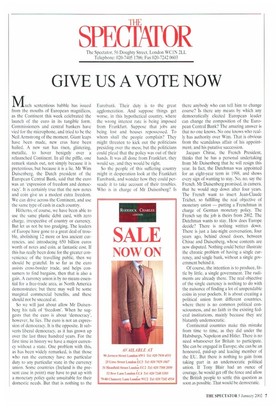GIVE US A VOTE NOW
Much sententious babble has issued from the mouths of European magnificos, as the Continent this week celebrated the launch of the euro in its tangible form. Commissioners and central bankers have vied for the microphone, and tried to be the Neil Armstrong of the moment. Giant leaps have been made, new eras have been hailed. A new sun has risen, glistering, metallic, to hover benignly over a relaunched Continent. In all the piffle, one remark stands out, not simply because it is pretentious, but because it is a lie. Mr Wim Duisenberg. the Dutch president of the European Central Bank, said that the euro was an 'expression of freedom and democracy'. It is certainly true that the new notes and coin give us a modest extra freedom. We can drive across the Continent, and use the same type of cash in each country.
Hitherto, of course, we have been able to use the same plastic debit card, with zero charge, irrespective of country or currency. But let us not be too grudging. The leaders of Europe have gone to a great deal of trouble, abolishing 12 more or less ancient currencies, and introducing 650 billion euros worth of notes and coin, at fantastic cost. If this has really been done for the greater convenience of the travelling public, then we should be grateful. In so far as the euro assists cross-border trade, and helps consumers to find bargains, then that is also a gain. A currency union is by no means essential for a free-trade area, as North America demonstrates: but there may well be some marginal commercial benefits, and these should not be sneezed at.
So we will just about allow Mr Duisenberg his talk of 'freedom'. When he suggests that the euro is about 'democracy', however, he lies, The euro is not an expression of democracy. It is the opposite. It subverts liberal democracy, as it has grown up over the last three hundred years. For the first time in history we have a major currency without a state. One problem with this, as has been widely remarked, is that those who run the currency have no particular duty to any particular state in the currency union. Some countries (Ireland is the present case in point) may have to put up with a monetary policy quite unsuitable for their domestic needs. But that is nothing to the Eurobank. Their duty is to the great agglomeration. And suppose things get worse, in this hypothetical country, where the wrong interest rate is being imposed from Frankfurt. Suppose that jobs are being lost and houses repossessed. To whom shall the people complain? They might threaten to kick out the politicians presiding over the mess; but the politicians could plead that the policy was out of their hands. It was all done from Frankfurt, they would say, and they would be right.
So the people of this suffering country might in desperation look at the Frankfurt Furobank, and wonder how they could persuade it to take account of their troubles. Who is in charge of Mr Duisenberg? Is there anybody who can tell him to change course? Is there any means by which any democratically elected European leader can change the composition of the European Central Bank? The amazing answer is that no one knows. No one knows who really has authority over Wim. That is obvious from the scandalous affair of his appointment, and his putative succession.
Jacques Chirac, the French President, thinks that he has a personal undertaking from Mr Duisenberg that he will resign this year. In fact, the Dutchman was appointed for an eight-year term in 1998, and shows every sign of wanting to stay. No, no, say the French. Mr Duisenberg promised, in camera, that he would step down after four years. The French want to insert Jean-Claude Trichet, so fulfilling the real objective of monetary union — putting a Frenchman in charge of German monetary policy. The French say the job is theirs from 2002. The Dutchman wants to stay. How does Europe decide? There is nothing written down. There is just a late-night conversation, four years ago, behind closed doors, between Chirac and Duisenberg, whose contents are now disputed. Nothing could better illustrate the chronic problem of having a single currency, and single bank, without a single government behind it.
Of course, the intention is to produce, little by little, a single government. The rudiments are already there. The real objective of the single currency is nothing to do with the nuisance of finding a lot of unspendable coins in your pockets. It is about creating a political union from different countries, where there is no common political consciousness, and no faith in the existing federal institutions, mainly because they are blatantly undemocratic.
Continental countries make this mistake from time to time, as they did under the Habsburgs, Napoleon and Hitler. There is no need whatsoever for Britain to participate. She can be engaged in Europe; she can be an honoured, paid-up and leading member of the EU. But there is nothing to gain from taking part in an undemocratic political union. If Tony Blair had an ounce of courage, he would get off the fence and allow the British people to settle this question as soon as possible. That would be democratic.






















































 Previous page
Previous page